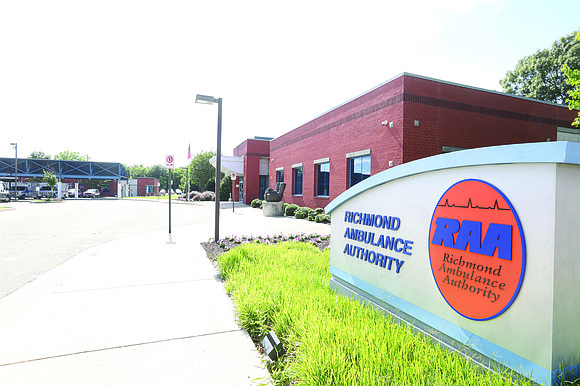RAA warns service in jeopardy without greater city subsidy
Jeremy M. Lazarus | 4/7/2022, 11 p.m.
Richmond has long boasted of having one of the best ambulance services in the country.
But the Richmond Ambulance Authority is warning City Council that the ability to maintain quality emergency response is being jeopardized by Mayor Levar M. Stoney’s decision to limit the city’s financial support.
In his proposed budget for the 2022-23 fiscal year that begins July 1, Mayor Stoney included $4 million in subsidy for RAA, the same amount as the current year and $3.5 million less than the ambulance service sought.
The spending plan is now in the hands of City Council, which is reviewing the proposal and considering amendments.
In a letter to the council obtained by the Free Press, RAA Board Chair Dr. Richard Bennett notified the council that the authority is “predicting an operating deficit” by the end of the new fiscal year on June 30, 2023, if the city’s subsidy is not increased to the requested level of $7.5 million.
Dr. Bennett noted that since the start of the pandemic two years ago, costs have skyrocketed while revenue from transporting patients has declined.
He stated that RAA, like other ambulance companies across the country, has seen a major increase in personnel turnover and has had increased difficulty in filling vacancies for trained emergency medical technicians and paramedics, problems similar to those faced by police departments, private businesses and government agencies.
The result: RAA has needed to boost pay in a bid to retain current personnel and attract new people in what Dr. Bennett described as a “fierce talent competition.”
RAA, which responds with the city Fire Department to health emergencies and crime scenes where people are injured, has reported fielding fewer ambulances and increasing response times as a result of personnel vacancies.
Dr. Bennett said RAA also has been buffeted by the rising prices of medical supplies and personal protection items, which have doubled and even tripled in cost due to supply chain disruptions during the pandemic.
In addition, RAA’s main revenue source, transports, has continued on a downward trajectory, he stated. RAA is not paid if there is no transport of a patient, and one-third of the patients who receive care at home or another location are not transported.
RAA also has not seen any increase in payments from Medicare, Medicaid and private insurers. Instead, those health insurers have put more of the burden on their customers by raising deductibles and co-pays, Dr. Bennett stated. Fewer transports means RAA receives less in direct insurance payments.
That’s why RAA needs the city to step up, he stated.
The city, which created the ambulance authority more than 30 years ago to improve emergency service, has long provided a subsidy to cover RAA’s cost to serve everyone, including individuals who are uninsured or have insurance coverage that does not cover the full cost.
The subsidy enables RAA to respond to emergencies that do not result in transports and to avoid having to sue people to try and collect the balance. RAA reports the majority of those treated are covered by Medicare or Medicaid, and likely lack the money to pay the costs that their insurance does not cover.
RAA “has been a good steward of public funding, but forces outside of our control have impacted our ability to provide service,” Dr. Bennett concluded in his appeal for the subsidy increase.
If council approves the increase, “what will (taxpayers) get for their money? It will enable RAA to more quickly return to the consistent level of excellent service that citizens of Richmond expect and deserve,” he said.








